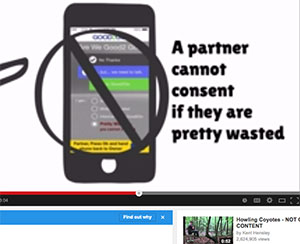
Should you have sex if one or both parties (let’s hope not more than that) is intoxicated?
It certainly causes problems, but it doesn’t mean under the law there’s no consent.
The University of Maryland appears to be telling its students exactly the opposite, according to The Diamondback:
Before taking this university’s sexual misconduct online training program this past semester, junior Matt Kerrigan said he hadn’t realized if a girl says “yes” while intoxicated, it doesn’t count as consent.
Kerrigan, a criminology and criminal justice major, is one of 22,299 students — 75 percent of the students at this university — who have completed or are in the process of completing the mandated training program as of Jan. 26.
News flash to administrators: For better or worse, because you’ve abdicated any moral authority over students, alcohol or other intoxicants are involved in a large part of campus hookups. It’s only nonconsensual if one party is “incapacitated.”
Defining all inebriated liaisons as nonconsensual makes it all the harder to identify those incidents that are rape. The school also sets the bar for sexual harassment as low as “gender stereotypes” and “unwanted comments about another person’s clothing.” At least the training doesn’t tell students they can’t consent if they are “pretty wasted,” a legally meaningless term, as the now-dormant Good2Go app told students.
The school thinks the misleading program’s 75 percent completion rate – after a seven-week extension – is evidence of its success, even though it’s supposedly mandatory and next year it will be tied to registration “for incoming freshmen and transfer students,” the Diamondback said.
And at the moment, it’s easy to click through:
Some students, such as Kerrigan, said while the program had some educational elements to it, he often would open a new tab while the video ran before pressing “Next” and moving on.
“It was respectable that it got sent, but it was easy to not pay attention to, so I’m not sure how much good it would do,” he said.
Even an ardent supporter of the training thinks it’s insulting to students and poorly designed:
I can read the actual sexual misconduct policy faster than I can get through this program. The whole presentation is full of redundant facts and interviews as well as barely entertaining skits. The intent makes sense that an utterly dry presentation could cause students to lose interest, but the office is dealing with a hostile audience that makes any hope of initial interest in the program a delusion. Each wasted minute only reaffirms the initial impression most students have that it’s a waste of time. There’s a lot of important material to communicate, and throwing in garbage to make it “light” is still throwing in garbage. Cut it down and recognize students’ schedules, or cut the fluff and replace it with actual content that respects the issue.
Second, the program needs active learning. I don’t mean it needs another attention checker like the “next” button; rather, it needs real input. Instead of watching video clips dead-eyed, students could be answering questions, providing feedback, filling out surveys, integrating social media, anything but 60 minutes of staring blankly followed by a cursory quiz. Learning about sexual misconduct shouldn’t feel like a trip to the Department of Motor Vehicles.
Ouch.
Greg Piper is an assistant editor at The College Fix. (@GregPiper)
Like The College Fix on Facebook / Follow us on Twitter
IMAGE: Good2Go screenshot
Like The College Fix on Facebook / Follow us on Twitter






Please join the conversation about our stories on Facebook, Twitter, Instagram, Reddit, MeWe, Rumble, Gab, Minds and Gettr.